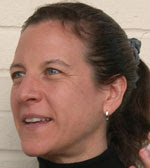"Should we listen to some of Beethoven's music?" I didn't know if she'd be interested. "Yes, I'd love to!" she replied. Without thinking, I put on a movement from Beethoven's Opus #109 Sonata. It was one I knew well. I myself wasn't sure where this listening experience would take us. As we both contemplated the music, I explained, "By the end of Beethoven's life, he had exploded the classical sonata form of music into something wholly new. This movement is a theme with variations." My student and I listened together. "First, you'll hear the theme. Then, you'll hear how Beethoven uses that theme to inspire new and different variations. Can you tell when a new variation begins?" As each variation began, my student became more animated. She was excited to hear the music as it morphed and shifted and developed into very different moods and rhythms. Listening intently to the music, she was delighted to identify each new variation.
"Believe it or not," I said to her when the music was finished, "You can do this, too. You can be this free, just as Beethoven was. Come...Let's try our own theme and variations." She was uncertain. "Really?" "Yes, we'll do it together." My student loves the traditional hymn Amazing Grace (I'm not sure if she caught the love of that song from me!). We sat down and started to play Amazing Grace in duet - that was our theme. "Let's venture out, like Beethoven, " I suggested. "Shall we try an upbeat, syncopated variation?" "Yes," she replied with anticipation, and yet uncertain of her own capacities. "You'll be able to do it. Just keep going and let yourself explore." I became animated in the rhythm. My student became animated in her melodic improvisation. The result was thrilling. Amazing Grace turned into something completely different. We were creating our own music, inspired by a theme we loved, moving into fresh and wonderful territory, just as Beethoven had!
The whole experience arose from my student's question at the beginning, "Who is that statue?" Following her curiosity and interest led us both into unknown territory. In every sense, the piano lesson was a duet between student and teacher.
To hear the Theme and Variations - begin at 6:20
For more about lessons visit, see videos, etc:
www.pianobeautiful.com/lessons.htm
For more about lessons visit, see videos, etc:
www.pianobeautiful.com/lessons.htm


No comments:
Post a Comment